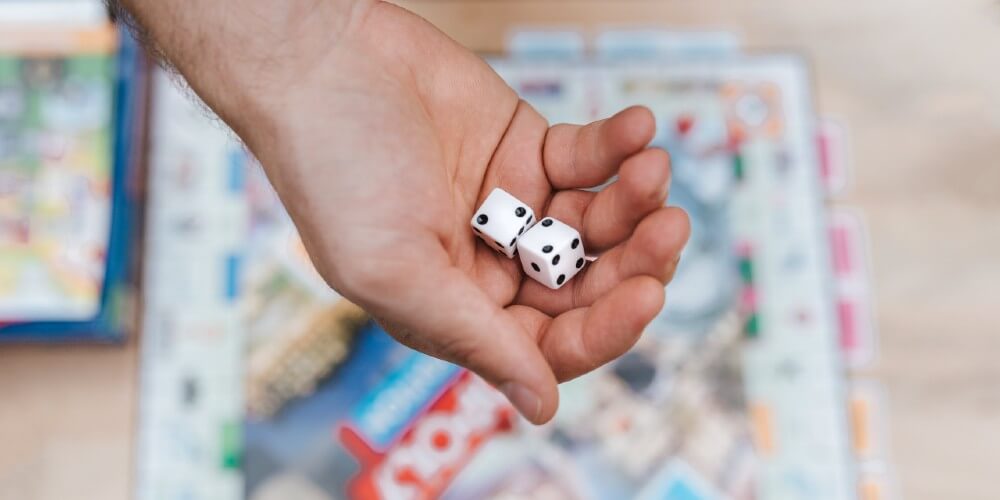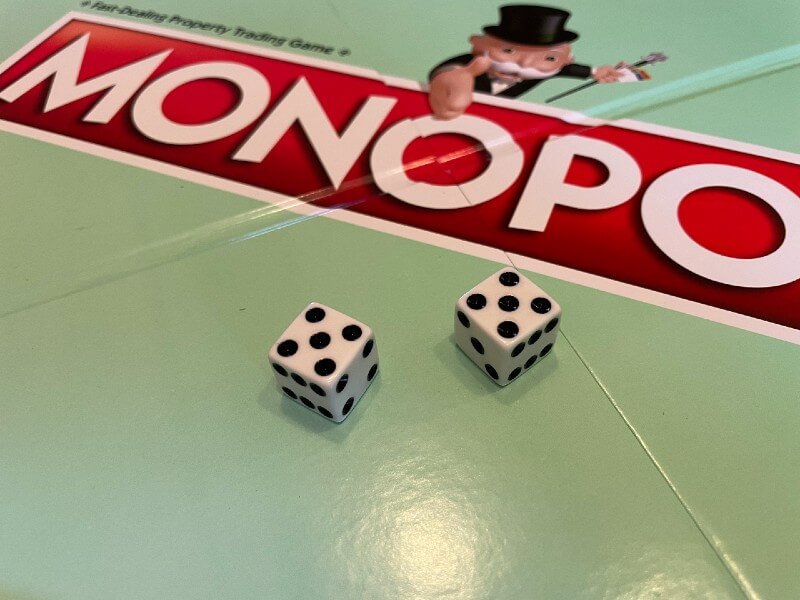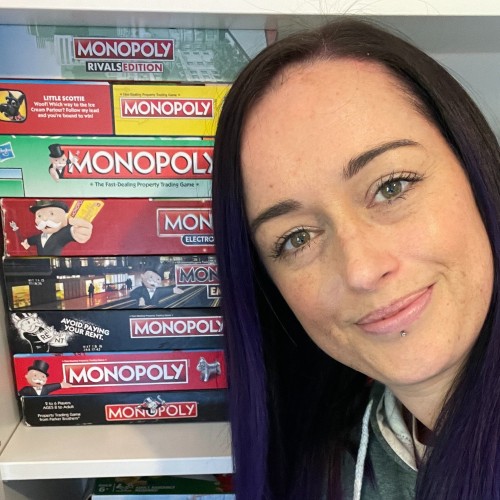Some of the Monopoly rules can be tricky to get your head around. The rules around rolling doubles are a perfect example of how complex the Monopoly rules can be.
So, if you’ve found yourself in an argument over the Monopoly doubles rules, or find yourself scratching your head while trying to interpret the rule book, read on for a full explanation of each rule…

Here’s the essential info about rolling doubles in Monopoly:
- The odds of rolling doubles is 1 in 6, or 16.67%
- If you roll doubles, you roll again once you’ve moved and taken actions on the space you landed on
- You don’t roll again if your previous double roll lands you in Jail, either from a Chance or Community Chest card, or landing on the Go To Jail space
- If you roll doubles consecutively three times, you go straight to Jail
- You can roll doubles to get out of Jail, but if you fail on 3 turns you must pay the fine
But, there are a few more nuances when it comes to doubles, so read on for the seven rules you must know to play the game correctly…
Can you roll doubles in Monopoly?
Yes, you can roll doubles in Monopoly. The standard version of the game uses two identical six-sided dice so it is possible to roll doubles when taking your turn. Even with a Speed Die, you can still roll doubles with the other two regular dice.
Various things happen if you roll a double in Monopoly, some of which are good and some of which may not be helpful…

What’s the probability of rolling doubles?
If you roll two fair six-sided dice, the probability that both dice show the same number is 1 in 6 (or 16.67%). This is because the second die has six possible outcomes and one of these six will match the first die.
Each dice roll is random. So, your chance of rolling doubles in a particular throw is not affected by how often you have rolled doubles in the past.
Suggested read: Monopoly Statistics That Will Help You Win!
What happens if you roll doubles in Monopoly?
When you roll doubles in Monopoly, you get to roll again. If you roll three doubles in a row, you go straight to jail. Throwing doubles can also get you out of jail.
Rolling doubles is a great way to get around the board quickly in Monopoly. Even if you roll snake eyes (double one), you’re essentially gaining two free spaces before then taking another turn.
If you’re lucky enough to roll doubles in your first turns you might reach the higher-value properties sooner and can buy more of them before your competitors get going.
However, there’s a risk – if you roll three sets of doubles in a row in your turn, you have to go straight to jail. Uh oh!
Since each roll is pure luck, there’s no advice here – But let’s go through the various scenarios of what happens when you roll doubles in a standard game of Monopoly.
Here are seven rules around rolling doubles in Monopoly that you need to know….
1. Rolling doubles
?
What happens when you roll doubles in Monopoly?
When you roll doubles in Monopoly, move your token by the number of spaces indicated on the dice then take any action for the space you land on.
Then, roll again, move your token again, and take any actions.
Some people believe that when you roll doubles, you move the number of spaces but then don’t take any action, and immediately roll again. That’s incorrect.
You have to complete your full actions for the space you land on before rolling again
Don’t let another player move off your property without paying rent if they’ve landed there with a double – they need to pay up before rolling again!
The only space that ends your turn if you land on it with a double is the Go To Jail space.
2. Rolling three doubles
?
What happens when you roll 3 doubles in Monopoly?
If you roll three doubles in a row in Monopoly, you’re considered to be ‘speeding’ and you head straight to jail.
As soon as you roll the third double, pick up your playing piece and move it to jail without taking your third turn.
The idea behind the three doubles rule in Monopoly is that if you roll three doubles in a row, you’re moving around the board too quickly.
It’s not your fault, you’re just lucky. Or in this case, unlucky, because that means the rules consider you to be ‘speeding’ and so you get sent to jail. No speeding tickets in Monopoly, just prison time.
Don’t get too excited when your roll that second double – you might have had a great turn, but on the third roll you’ve got a 1 in 6 (or 16.67%) chance of going to jail with your third roll.
You have to be pretty unlucky to roll three doubles in a row in Monopoly. This has just a 0.46% chance of happening, which is approximately once in every 200 turns.
3. Rolling a double while in Jail
?
How do you get out of Jail with doubles in Monopoly?
When you’re in Monopoly jail and it’s your turn, you can choose to buy your way out or try to roll a double.
If you get the double, you move that number of spaces and take any necessary action. You don’t get to roll again.
According to the Monopoly jail rules, there are three ways to get out of jail…
- Pay a $50 fine
- Use a ‘Get Out of Jail Free’ card
- Roll doubles
If you want to get out of jail without paying a fine or using a ‘Get Out of Jail Free‘ card, you can attempt to roll a double.
You can roll once per turn, which means that you only have three chances to attempt to roll a double.
If you fail on your third attempt then you are forced to pay the $50 fine. If you don’t have the $50 and you have no assets to mortgage then you are bankrupt and lose the game.
The odds of rolling a double at least once in three attempts are good. The way you calculate it is a little complex, but this is how I worked out the odds…
- For each roll, you have a 1 in 6 chance of rolling a double. So, on your first roll, the odds at 1/6
- For the second roll, you need to account for the fact you didn’t roll a double with your first roll, which happens 5 out of 6 times. Then you roll a double, which is a 1 in 6 chance. 5/6 multiplied by 1/6 makes 5/36.
- If you roll a double on the third try, then that’s 5 out of 6 times you missed it on roll one, 5 out of 6 times you missed it on roll two, and then 1 in 6 times you will roll it on roll three. Multiply all these together and you get 25/216.
- Add together 1/6 (simplify it to 36/256) and 5/36 (simplified to 30/256) and 25/216 and you get 91/256.
So, the chance of rolling a double across three turns is 91/256. This equates to 42%.
4. Rolling a double one
?
What happens if you roll snake eyes in Monopoly?
In the official Monopoly rules, rolling snake eyes (double ones) is the same as rolling any other double – there is no special bonus.
A common house rule is that rolling snake eyes earns a cash reward, but, you must declare any house rules at the start of the game.
Monopoly house rules are not official rules, although Hasbro has released some suggested house rules that players can choose to use. These are also often included in video game versions of Monopoly.
A common reward for rolling snake eyes according to Monopoly house rules is for the player to get $500, although you can set that cash limit at whatever you wish.
Another variation is that a player rolling snake eyes does not owe rent for the next space that they land on.
Suggested read: The Best Monopoly House Rules
5. Buying on a double
?
Can you buy property on a double roll in Monopoly?
If you land on an unowned property after rolling a double, you can buy it, or it can be auctioned as normal.
Whenever you roll a double during your Monopoly turn, you must complete all actions on the space you land on before taking your next roll.
Think of each time you roll a double in Monopoly as a break in your turn. Whichever space you land on, you must complete the actions before rolling again.
If you landed on a space asking you to draw a card, and you were sent to a different property following the card’s instructions, then you could buy this property if it’s available. You would then continue your turn with your next roll from the new space that you were sent to.
6. Landing on the Go to Jail space with a double
?
What happens if you roll doubles and land on Go To Jail?
In Monopoly, if you roll doubles and land on the Go To Jail space, you are sent to jail and your turn ends immediately.
You do not get to use a bonus roll earned from the double to try and escape. You have to wait until your next turn.
The Go To Jail space is the only square on the Monopoly board that ends a sequence of double rolls.
If you’re unlucky enough to land on Go To Jail with your first or second double in a turn, you must move your token straight to jail.
Be extra careful if your second double lands you an odd number of spaces away from the Go To Jail corner… This means that you have even more chances of ending your turn in jail either from a third double or by landing on the space with another roll.
7. Building houses in between doubles
?
Can I build houses in between someone’s turns when they roll doubles?
In Monopoly, you are allowed to build houses at the end of someone else’s turn.
However, that doesn’t include in between doubles rolls. You can only buy houses at the end of another player’s complete turn.
If a player rolls doubles and ends up close to a color set that you own, you aren’t able to take advantage and load it up with houses. You must wait until they have finished their complete turn to buy or sell houses or hotels.
All you can do in this situation is to hope that they roll a low number on their second roll, and then once their turn is over you can develop your properties.
Suggested read: Monopoly House Buying Rules
To conclude
Rolling doubles is useful in Monopoly when you want to get around the board quickly.
Doubles aren’t always lucky though – you might be trying to hold off from approaching an opponent’s color set until you have more cash, and a double could get you closer sooner than you’d like.
Remember, if you roll three doubles in a row, then you’re off to jail, which can mess up your strategy. But, if you’re low on funds, it’s worth trying to roll your way out, since it’ll work almost 50% of the time.
And, don’t forget to look at some of the house rules you can add to your game to mix it up, including bonus cash for snake eyes, which can turn the lowest roll possible into a winning situation.

